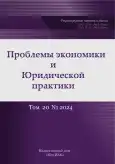Digital Dictatorship as an Actual Socio-Political Discourse: Prospects for Further Research (Lawyer's Opinion)
- Authors: Belikova K.M.1
-
Affiliations:
- Kutafin Moscow State Law University
- Issue: Vol 20, No 1 (2024)
- Pages: 40-46
- Section: Private Law (Civil) Sciences
- URL: https://journal-vniispk.ru/2541-8025/article/view/284278
- DOI: https://doi.org/10.33693/2541-8025-2024-20-1-40-46
- EDN: https://elibrary.ru/QOUZWY
- ID: 284278
Cite item
Abstract
The subject-matter of this article is to identify the prospects for further research of digital dictatorship in order to substantiate on the basis of understanding and analyzing the ideas of socio-political discourse around this topic of real and fictional, imaginary threats to digitalization in the context of the level of legal awareness of the public and political circles of a number of countries and those innovations and/or trends that are perceived as manifested or potential threats to compliance human rights, and set out a modern vision of the development of digitalization of society and law based on ethics, which is able to help shape the image of Russia as an ethical state of the future of a new type, based on Russian values and value constants of Russian civilization and a special socio-political ethos, which is the result of the synergy of the identity and community of the peoples of Russia.
About the authors
Ksenia M. Belikova
Kutafin Moscow State Law University
Author for correspondence.
Email: BelikovaKsenia@yandex.ru
ORCID iD: 0000-0001-8068-1616
Dr. Sci. (Law), Professor, Professor of the Department of Entrepreneurial and Corporate Law
Russian Federation, MoscowReferences
- Aristov E.V. «Welfare State» in Japan: constitutional and legal research // Science and education: economy and economics; entrepreneurship; law and management. —2015. —No. 10. —pp. 67–72.
- Aristov E.V. Welfare State in the Republic of South Africa // Historical, philosophical, political and legal sciences, cultural studies and art criticism. Questions of theory and practice. —2015. —No. 12. Part I. —pp. 22–25.
- Belikova K.M. Directions and prospects for the development and application of artificial intelligence in the military sphere in South Africa // Law and politics. —2021. —No. 9. doi: 10.7256/2454-0706.2021.9.36076 URL: https://nbpublish.com/library_read_article.php?id=36076 (date of application: 04/14/2023).
- Belikova K.M. The basis of legal regulation of the development and application of artificial intelligence in the military sphere of China in the context of state strategy and protection of copyright and patent rights // Gaps in Russian legislation. 2020. Vol. 13. No.5. pp. 223–233.
- Belikova K.M. The development of artificial intelligence in Brazil: emphasis on the military and intellectual property issues // Law and politics. —2021. —No. 10. doi: 10.7256/2454- 0706.2021.10.36096 URL: https://nbpublish.com/library_read_article.php?id=36096 (accessed: 04/15/2023).
- Veduta E.N., Poteryaiko A.Y. Digital dictatorship or digital democracy? // Current issues of economics, management and law: collection of scientific papers (Yearbook). —2020. —No.4. —pp. 4–34. URL: https://elibrary.ru/item.asp?id=44939726 (accessed: 04/14/2023).
- Volkov S.Yu., Kondratiev A.S. The formation of a digital dictatorship as an actual socio-political problem [Electronic resource] // Ogarev-online. —2022. —No.6. —Access mode: https://journal.mrsu.ru/arts/formirovanie-cifrovoj-diktatury-kak-aktualnaya-obshhestvenno-politicheskaya-problema (accessed: 04/15/2023).
- Zorkin V. The law of the future in the era of numbers. Individual freedom or a strong state? April 15, 2020. URL: https://rg-ru.turbopages.org/rg.ru/s/2020/04/15/zorkin-pravo-budushchego-eto-te-zhe-vechnye-cennosti-svobody-i-spravedlivosti.html (accessed: 04/09/2023).
- Zorkin V.D. Western elites impose values alien to the people on the world. Lecture for the participants of the International Legal Forum. St. Petersburg. May 19, 2016, 05/19/2016. URL: https://rg.ru/2016/05/19/valerij-zorkin-zapadnye-elity-naviazyvaiut-miru-chuzhdye-naroducennosti.html (accessed: 04/12/2023).
- Elon Musk called for a temporary halt to the improvement of neural networks. 29.03.2023. URL: https://ria.ru/20230329/razrabotka-1861573680.html?ysclid=lgf3431lnz91987958 (accessed: 04/13/2023).
- Kuleshov S. Digital dictatorship: how companies turn remote work into hell. // Forbes. April 15, 2020. URL: https://www.forbes.ru/biznes/397989-cifrovaya-diktatura-kak-kompanii-prevrashchayut-distancionnuyu-rabotu-v-ad?ysclid=lghne5rv46602603422 (accessed: 04/15/2023).
- Nemytina M.V. Scientific approaches and research methods in jurisprudence. // Courier of Kutafin Moscow State Law University (MSAL). —2022. —№9. —P. 72–83. doi: 10.17803/2311-5998.2022.97.9.072-083.
- Petrov A.A. A digital dictatorship or welfare society is being created in China. // Yearbook on the materials of the Third International Scientific and Practical Conference «Greater Eurasia: Development, Security, cooperation (Moscow, October 14-15, 2020)». Vol.4, Part 1. RAS. INION. Scientific department. cooperation; Ed. by V.I. Gerasimov. —M.: INION RAS, 2021. —pp. 504–523.
- Petrov A.A. Ideology and experimental projects of China's point-rating system. // Chronos. 2020. No. 9 (48). pp. 12–24.
- Petrov A.A. The Chinese system of total control over society. // Chronos. 2020. No. 9 (48). pp. 25–36.
- Petrov A.A. Chinese digital profile or social trust scoring system. // Chronos. 2020. No. 8 (47). pp. 11–24.
- Petrov A.A. The latest tools of the Fourth Industrial Revolution and digital mechanisms of control and management of society. // Chronos. 2020. No. 8 (47). pp. 24–34.
- Development of some private law institutions under the influence of networking of the economy: monograph. / K.M. Belikova et al.; Ed. Belikova K.M. —Moscow: Printing house MDMprint LLC (MDM Printing Salon), 2021. —564 pp.; pict.
- Kharichev A.D., Shutov A.Yu., Polosin A.V., Sokolova E.N. Perception of basic values, factors and structures of socio-historical development of Russia (based on research and approbation) // Journal of Political Studies. —2022. —Volume 6. —No. 3. —pp. 9–19. doi: 10.12737/2587-6295-2022-6-3-9-19 URL: https://naukaru.ru/temp/13139fb730ab6c6065a89176fbc2ca8e.pdf (accessed: 04/09/2023).
- Coleman S., Blumler J. G. The Wisdom of Which Crowd? // The Political Quarterly. —2007. —No 82 (3). —P. 355–364.
- George Soros. The AI Threat to Open Societies. Jan 24, 2019. URL: https://www.project-syndicate.org/onpoint/the-ai-threat-to-open societies-by-george-soros-2019-01 (дата обращения: 15.04.2023).
- Kenneth Hacker and Jan van Dijk. What Is Digital Democracy? // Digital Democracy: Issues of Theory and Practice (Eds. Kenneth Hacker and Jan van Dijk). —CA: Sage Publications, 2000. —P. 1–9.
Supplementary files








